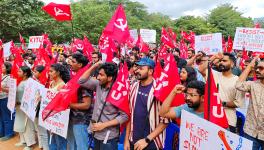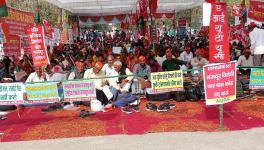What Wage Negotiations? New Wage Policy for Public Sector Workers Leaves Little Room
the guidelines look to reduce benefits.

The Union Cabinet on 22 November 2017 approved the Wage Policy for the 8th Round of Wage Negotiations for workmen in Central Public Sector Enterprises (CPSEs). But the trade unions are not happy with the conditions.
The wage revision for the workers of CPSEs has been due since 1 January 2017, after the validity of the last wage settlement (the 7th round of wage negotiations) ended on 31 December 2017.
However, the policy does not address the long-standing demands that the trade unions have been raising regarding the wage revision policies, even as it adds new problematic conditions.
In fact, many of these demands were reiterated at the Joint National Workshop of Workers in Central Public Sector Undertakings (CPSUs), which was held on 22 October 2017 in Hyderabad, where the overdue wage revision negotiations was on top of the agenda.
More than 150 representatives of the unions in CPSUs from across the country had participated.
Major central trade unions took part in the workshop, including Centre of Indian Trade Unions (CITU), Indian National Trade Union Congress (INTUC), All India Trade Union Congres (AITUC), Hind Mazdoor Sabha (HMS) and Labour Progressive Federation (LPF). The Joint Action Front, Bengaluru and the Coordination Committee of Public Sector Trade Unions, Hyderabad also participated.
The revision of wages for the category of workers – who do not belong to the category of executives/officers and non-unionized supervisors – is decided by trade unions and managements of the CPSEs based on the guidelines issued by the Department of Public Enterprises (DPE) for wage negotiations.
A long-standing demand that unions have been fighting for is the 5-year periodicity of wage revision – the number of years after which the wages shall be revised.
Currently, there are two sets of periodicity for wage revision for the workers of CPSEs – 5 years and 10 years.
As the new policy states (clause ix): “The validity period of wage settlement would be for a minimum period of five years for those who opted for a five year periodicity and for a maximum period of ten years for those who have opted for a ten year periodicity of wage negotiation w.e.f. 01.01.2017.”
Earlier, the wages of public sector workers were revised every five years.
However, the 1st Pay Revision Committee (PRC) for the Executives of CPSUs, chaired by Justice Mohan, recommended a 10-year wage revision in 1997.
And from the 6th round of wage negotiations—which fell due on 1 January 1997—onwards, the government imposed a periodicity of 10 years on workers as well.
But trade unions fought tooth and nail against this. In response to the joint trade union protests, the government in 2007 reached a compromise and left it to the managements of the CPSEs to opt for a periodicity of either 5 years or 10 years.
Workers’ unions in six CPSEs managed to retain the periodicity of 5 years – Coal India Limited, Steel Authority of India Limited, Hindustan Aeronautics Limited, National Mineral Development Corporation, Neyveli Lignite Corporation, and 13 Major Port Trusts.
But the rest of the workers continue to languish with unrevised wages for 10 years.
“In the beginning, from the 1970s onwards, the wage revision period used to be three years. Later, the government made it five years. But it must not be more than 5 years. In most developed countries, wages are revised yearly,” said S Dev Roye, secretary of the Centre of Indian Trade Unions (CITU), to Newsclick.
In fact, this was among the foremost demands that the trade unions articulated at the end of the joint national workshop: “Tenure of wage revision should not be more than five years as already achieved by the six CPSUs noted above.”
However, the new wage policy also introuces a major anti-worker condition: “graded DA neutralization and graded fitment”.
“To avoid conflict of pay scales of executives/non-unionised supervisors with that of their workmen, CPSEs may consider adoption of graded DA neutralization and/or graded fitment during the wage negotiations,” states Clause vi.
Dearness Allowance (DA) is an allowance to adjust to the cost of living expenses as they increase with the overall price rise, or inflation. DA neutralization is the computation or calculation of DA so that it neutralizes or compensates for the inflation rates.
As for fitment benefit, fitment is the increase in the basic salary. Fitment – or the increase – is a particular percentage of the sum of the old basic pay and the DA.
Graded DA neutralization and graded fitment means that there will be different slabs for the DA payment according to the workers’ grade or level: those at a higher grade will get more allowance while workers at the lower grades will get lesser and lesser allowance.
Trade unions are strongly opposing this new clause.
“In the old days, these rates used to be graded, but trade unions fought for a uniform rate across grades of workers. For over three decades, we’ve had uniform or flat rates,” said Dev Roye.
“This is a losing proposition, particularly, for the lower-grade and already low-earning workman.”
Just as the 10-year periodicity was imposed on the workers, other regressive and atrocious conditions of the pay revision order for executives are likely to be imposed on the workers as well, said Dev Roye.
The recommendations of the 3rd Pay Revision Committee for Executives (Board level and below Board level executives and non-unionized Supervisors) of the CPSEs, chaired by Justice Satish Chandra, scales down a lot of past benefits and imposes stringent pre-conditions. The central government issued the notification for its implementation on 3 August 2017.
One of those most problematic conditions is that it reduces the fitment benefit to 15% for executives, while earlier it used to be 30%.
But there are more anti-worker conditionalities that the pay revision order for executives introduces.
Under the heading of “Affordability” is the most shocking condition:
“The revised pay scales would be implemented subject to the condition that the additional financial impact in the year of implementing the revised pay-package should not be more than 20% of the average Profit Before Tax (PBT) of the last three financial years preceding the year of implementation.”
This basically means that the financial impact of the revised pay scales for executives should not be more than 20% of the Profit Before Tax of the last three years.
And if it is more than 20%, then the pay would be reduced to bring the impact under 20%.
These concerns regarding the orders for executives being imposed on workers were also raised at the joint national workshop.
“The wage policy states that managements are ‘free’ to negotiate, but we know from past experience that they are not free at all. The managements are under pressure from the government,” said Dev Roye.
As has happened earlier, the government shall try to impose the conditions for the executives on the workers, who will be affected much more
In the wage policy for workers, there are other financial conditionalities, such as:
“ii. No budgetary support for any wage increase shall be provided by the Government. The entire financial implication would be borne by the respective CPSEs from their internal resources.”
Then there is a clause requiring that “the wage revision shall be subject to the condition that there shall be no increase in labour cost per physical unit of output.”
In absence of government support, and given the way the government is bent on dismantling the public sector enterprises through massive privatization, closures, etc – these conditions effectively rob the “wage negotiations” of meaning, leaving little room for any meaningful rise in wages for workers of CPSEs.
“These financial conditionalities are an infringement on our right to collective bargaining,” said Dev Roye.
“In order to implement all the conditions, various anti-worker measures will become inevitable. All PSUs are not in a position to meet these conditions. Maybe around 10%, or maximum 20%, of the PSUs will be able to implement the conditions along with any meaningful rise in pay. This will deprive huge sections of public sector workers of the benefits of pay revision.”
Get the latest reports & analysis with people's perspective on Protests, movements & deep analytical videos, discussions of the current affairs in your Telegram app. Subscribe to NewsClick's Telegram channel & get Real-Time updates on stories, as they get published on our website.
























